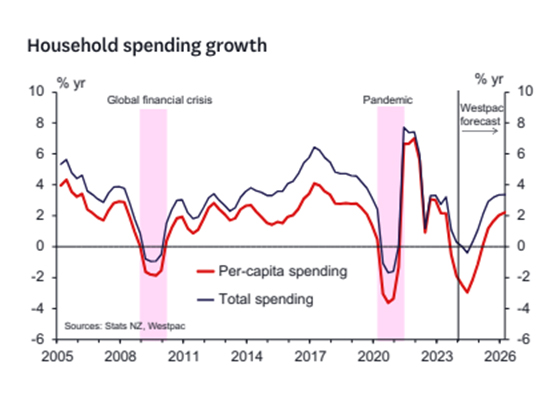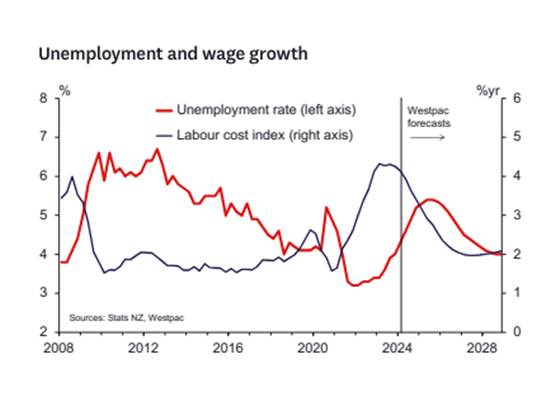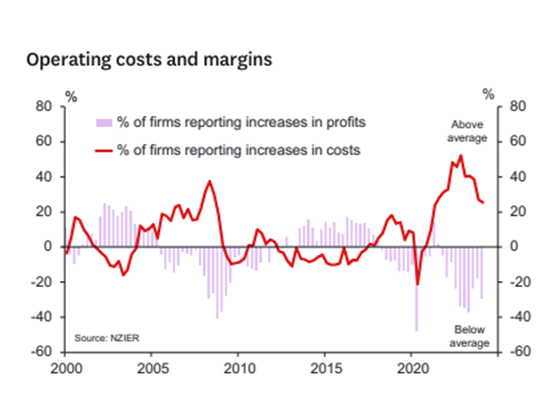The Remaining Year Ahead: Important Economic Insights for New Zealand Businesses in 2024
As we move towards the second half of 2024, there’s no better time to assess how the New Zealand economy performed in the previous months, and what lies ahead for businesses in the environment.
New Zealand businesses have consistently navigated a volatile economy in recent years, with rising inflation, interest rates, and limp consumer spending. While businesses readjust to these dynamics, the question remains—how long will it last?
The Westpac NZ Economic Overview May 2024 is a flagship document highlighting the nation’s outlook on its economy, policies, and financial markets. In this article, we summarise the key statistics that businesses should know in the year ahead.

Cash rates to remain until 2025
According to Westpac, New Zealand’s official cash rate (OCR) will remain unchanged this year despite the weak economy and spending. However, businesses can possibly look forward to a better monetary policy in 2025 if broader economic pressures, such as US interest rates and the labour market, cool down.
The report forecasts that the RBNZ will keep the OCR at 5.5% until February 2025, when it’s certain that inflation will stay below 2.5%. Businesses can see a decrease in the OCR after February, easing the pressure of doing business. Westpac claims the RBNZ will be content with an ‘almost 2%’ CPI.
GDP to grow slowly in the second half of 2024

Economic growth was flat over 2023 and the first half of 2024, with forecasts expecting it to grow at only 0.7% in the second half of 2024. While some industries have seen a slight increase in trade, the ongoing recovery in tourism and strong net migration continues to stagnate GDP growth.
GDP growth is also somewhat restrained by New Zealand’s tight financial conditions and moderate economic conditions of the nation’s key trading partners. However, inflation will remain unchanged despite the weaker GDP. Although the growth outlook is positive, businesses are not expected to see its effects immediately and should remain cautious.
Household spending remains weak

Kiwi households have seen a significant drop in consumer confidence for the past year, reducing their discretionary spending in an uncertain market. As the OCR stays unchanged and borrowing costs add pressure, household spending will remain weak in 2024.
The Westpac report highlights that mortgage rates have risen from 3.2% in 2022 to 6.0% today. This poses a significant financial strain on Kiwi households, who choose to halt spending until interest rates decrease. However, the reports also mention that household debt servicing remains manageable.
The weaker labour market is also cited as a critical risk affecting household spending, which brings us to the next notable insight.
Unemployment rates rise and wage growth slows

New Zealand’s labour market has softened recently, with the unemployment rate projected to rise further in the year ahead. Westpac forecasts that unemployment, sitting at 4.3% in the March 2024 quarter, will rise to a peak at 5.4% in 2025. Additionally, wage growth will continue to be moderate due to the easing of cost-of-living pressures and a slowdown in the job market.
Migration is a key factor affecting employment, as New Zealand remains an attractive job market for international job seekers. However, net inward migration has peaked and is expected to slow to around 75,000 in the remainder of 2024.
Businesses halt expansion as margin tightens

Businesses will continue to be risk averse as margins remain tight. According to Westpac, businesses around the country have highlighted the increasingly tough trading environment, with slow order demand and higher operating costs.
Because of the slack economic growth, businesses have stopped hiring, and staff turnover has decreased. Many businesses have also scaled back or delayed their plans for capital expenditures, such as maintenance and capital replacement. However, this may change once the economic conditions improve.
Key takeaway
As businesses navigate the year ahead, resilience and risk management are vital to maintaining a healthy cash flow. Businesses, particularly SMEs, should make efforts to safeguard themselves against uncontrolled economic factors that may disrupt their business.
Bonded NZ helps businesses remain efficient in economic uncertainties through comprehensive and tailored business insurance. Whether it's public liability or professional indemnity insurance, our cost-effective options help them secure their business at every angle.
For more information about our services, contact our team today.
 =
=